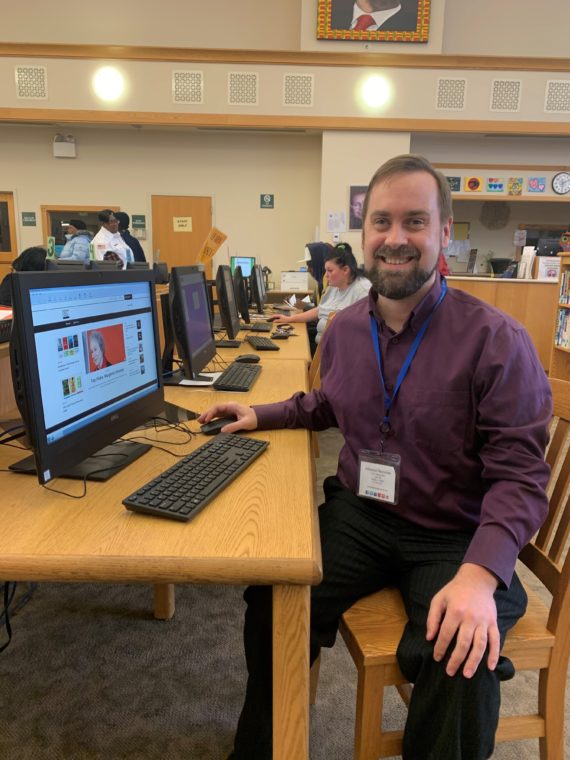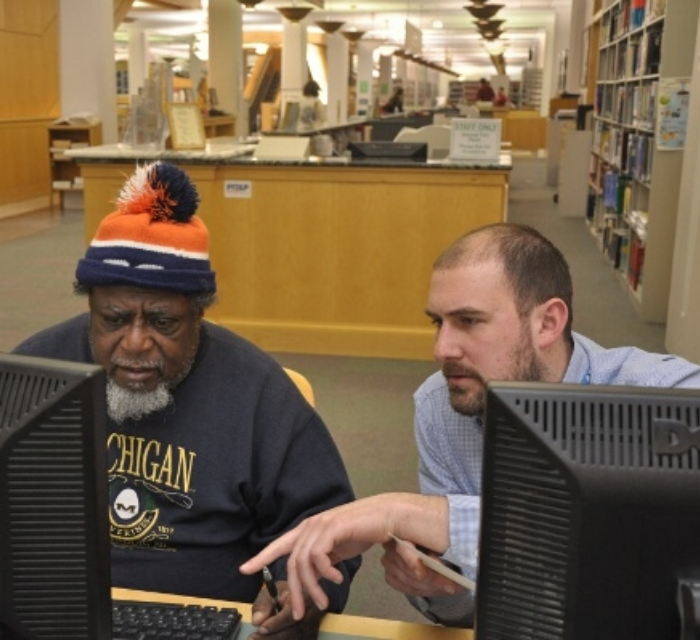CyberNavigator Nathan’s motto comes in the form of a question, “What can I do in one hour that will make a difference in someone’s life today?”

It was a busy morning for Nathan, jostling between computers, assisting multiple patrons at once. “Most of them need help conducting job searches,” Nathan begins. Usually, patrons tried looking for jobs on their own, going from one company to the next, resume in hand only to receive the same response: Please apply online.
“For people with limited access and experience with computers, hearing these words meant their path to employment became more challenging.”

Through word of mouth and community outreach, job seekers find out that CPL offers free training with a CyberNavigator. So, they head to the Library.
Technology is not a barrier; it’s part of the solution
Facing issues of food insecurity, banking challenges, or unemployment, a lot of patrons begin their digital literacy journey thinking of technology as one more hurdle to overcome. “As a CyberNavigator, the first step is to make my students understand that technology is not the problem; it’s part of the solution,” says Nathan.
To initiate this change in perspective, Nathan takes the time to get to know the patrons he works with – their goals, their stories, their motivations. “It could be finding a job, applying for any number of public services that are now online, or connecting with families. Together, we figure out how to use technology to get them on the path they want to be on,” he shares.
Nathan understands that a lot of this technology uncertainty comes from a place of insecurity. Most of his students don’t own a computer. Some of them have not even seen a mouse or a keyboard before. That’s why it’s crucial for Nathan to become a reassuring voice.
“I always tell them; ‘I know it’s scary, but I’ll help you. We can build a resume. We can look through job sites. We can do this together.’ “
Once patrons realize that technology can indeed help, they become more open to learning.
The ingredients for digital literacy: patience, confidence, and perseverance
So how do you build digital literacy skills? One step at a time. “Online job applications can be daunting, especially if you’re doing it for the first time. So, I break the process into steps. For example, we start with setting up an email,” Nathan explains.
Just as important in the sessions is building confidence.
“I’m terrible at typing,” a patron beside Nathan says in an almost-whisper. “But look what you did today. You finished one page of your resume,” Nathan counters. Turning back to me, he continues, “We celebrate progress. I constantly remind them that it’s the little things that lead to the big wins. It’s more than just teaching skills; it’s letting patrons know they can do it.”
Confidence also means taking things at the patron’s pace and being there for them each step of the way. Maurice was hesitant about starting his digital literacy lessons because he has never used a computer before. But he wanted to learn so that he can apply for jobs online. “I listened to his fears and assured him that I’d guide him throughout the process,” Nathan shares.
After months of working together – from adjusting the screen size so he could read better to learning Word and Excel – Maurice got a job!
“Maurice returned, excited about the fantastic news. He thanked me for getting him the job. I smiled and told him that he did the learning. He finished his resume. He passed the interview. He got the job. You can see the pride in Maurice’s smile. Witnessing patrons succeed and seeing them grow in confidence is the most rewarding part of being a CyberNavigator.”
No help is too small
After a year of teaching digital literacy to patrons at the West Englewood branch, Nathan still finds every lesson as eye-opening as it is fulfilling. “No help is too small,” he shares. “Whether it’s helping people print a bank statement or build an online resume, it’s about empowering people and communities. It’s about assuring them that despite the challenges they face, they will always find a helping hand at the Library,” Nathan shares humbly.


